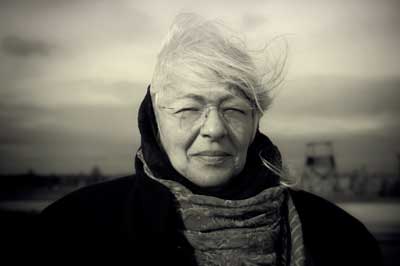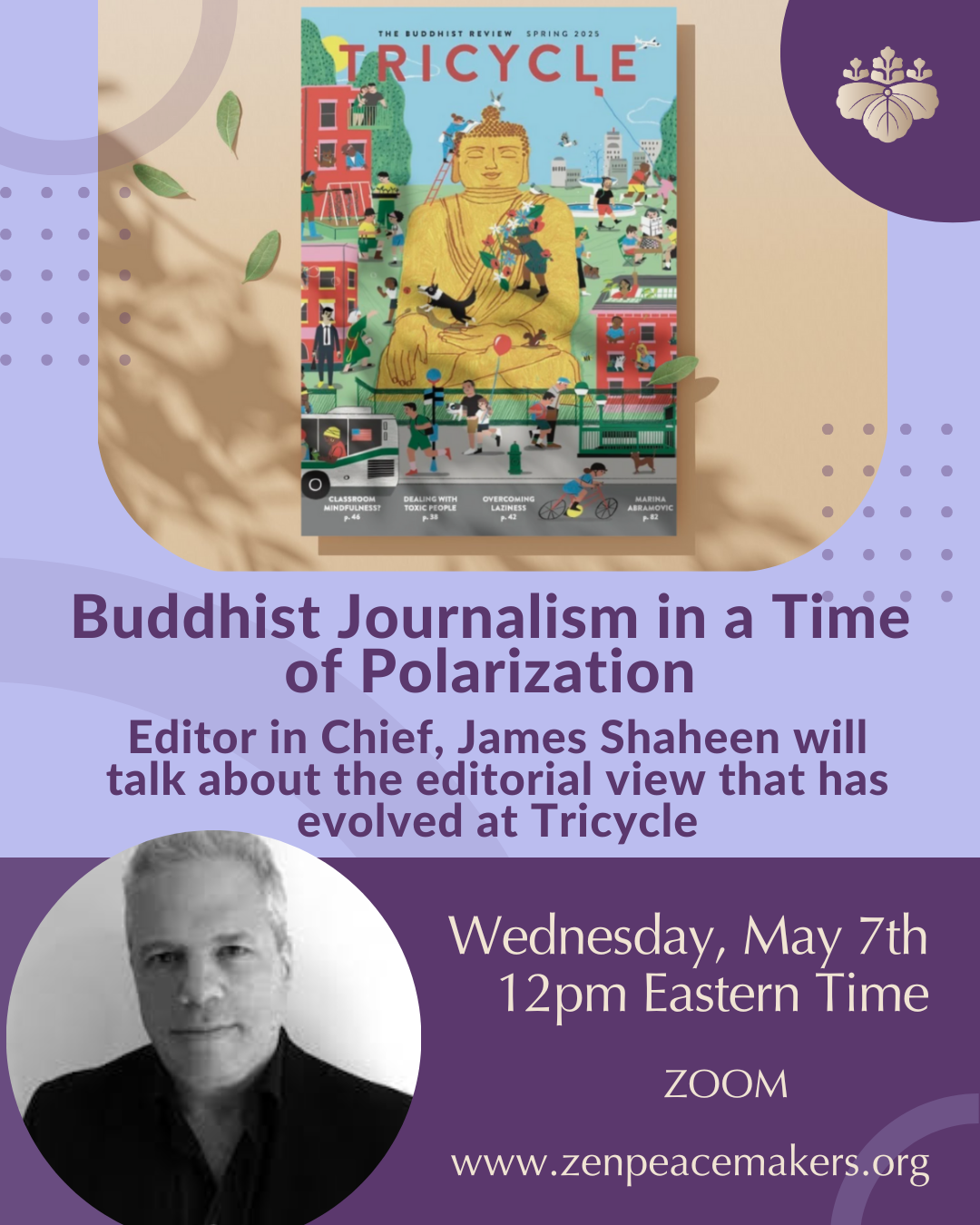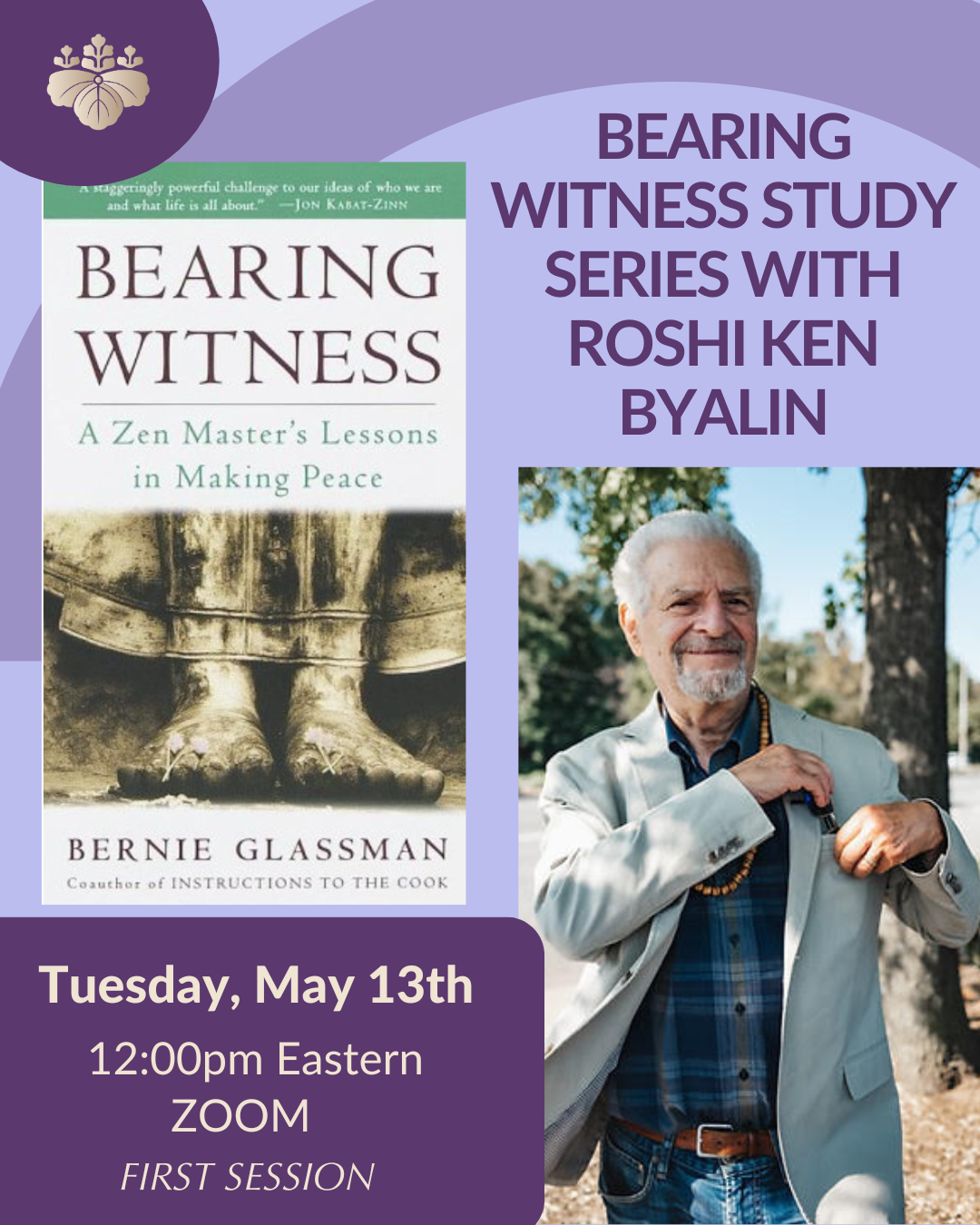Reading for Orcas Island, WA Historical Society & Eth-Noh-Tec, a collaboration between the “Smithsonian Institution’s Journey Stories” & Humanities Washington. August 7, 2010
“Journeys That Shape Our Lives”
by Ginni Stern, in honor of my father, Victor N. Stern who died in a clean bed on February 25, 2008.
“The past is never dead. It’s never even the past.”
~ William Faulkner
MY JOURNEYS TO AUSCHWITZ
My first trip to Poland to visit Auschwitz was in November 1996 for an international, interfaith retreat conceived of by Roshi Bernie Glassman, the founder of the Zen Peacemakers. We have returned to Poland to Bear Witness at Auschwitz annually – and I have served as the retreat coordinator for the past 10 years.
Upon hearing I was, once again, returning to Auschwitz, a friend asked, “Ginni why do you feel the need to return to Auschwitz every year? Why don’t you take a vacation to the South of France or a beach on St. Croix?” Sometimes I wonder myself.
I began going to Auschwitz to remember my fathers’ family who were murdered there…. and to Remember, by reading names from the Auschwitz Museum Archives, of people who died there, always adding the names of my fathers parents, brothers & sisters, their wives & husbands & their children – my father’s nieces & nephews – some just babies – about 40 in total.
I go to practice the Three Tenents of the Zen Peacemakers: Not-Knowing, Bearing Witness and Loving Action, but replied to my friend, simply: “I go to Remember.”
And I do go to remember, but over the years, as I watched wars in the Middle East, Bosnia, Sri Lanka, Cambodia, Ireland, Rwanda, Darfur, Congo, Chad, Afghanistan, Colombia, Pakistan and Iraq on TV, I began to ask myself questions like:
Why? What is it about basic human nature that has been and continues to lead people to resort to such inhumane violence?
Could I actually be driven to murder someone? I doubt it, but what if that someone came to kill or rape my children? Then maybe… Could I step into the shoes of the Nazi and kill?
The Polish people have left the concentration camp there and offer museum exhibits so people can learn about the history of happened in that Place. But what else is there to learn about the limits of human nature from the Auschwitz State Museum? Beyond the history of the Place, what does Auschwitz have to teach me – to teach us – about compassion, the limits of compassion, and the malleable boundaries of our own humanity?
Why haven’t the carnage & atrocities of the Holocaust been enough to alert our leaders to the fact that it is imperative for peaceful dialogue to become the norm as the way to resolve differences?
Auschwitz, to me, is an icon of inhumanity and one of the most profound Teachers of Love that I have met in my lifetime.
So, I go to Auschwitz to search out the small acts of kindness within the dark and painful sharp shadows of Auschwitz – to find the inevitable pockets of light within those shadows – and within myself.
I go to search for God. During the Holocaust, when someone asked Eli Weisel, “Where is God?” he wrote in his famous book “Night”, that he pointed to a dead child hanging on a noose and said, “There is God.”
Perhaps I simply go, for Auschwitz to teach me to behave as more of a mensch (a basically good person) in my day to day activities – at work, in traffic jams, when communication breaks down and frustration arises. At Auschwitz, when I do an unkind act, or say an unkind word, it is magnified and humbling to see this aspect of myself so stunningly clearly. Auschwitz is a mirror, if one finds the courage, there is a lot to see beyond the landscape, the barracks, the barbed wire and the chimneys that our cameras pick-up.
MY FATHER’S JOURNEY TO AUSCHWITZ
My paternal grandfather was the Hasidic Rabbi and teacher of the region in Romania where they lived before the war. My father was 18 years old when the Jews of his village were evacuated and herded to a nearby ghetto. He was, young and strong and escaped to hide in the forest. His non-Jewish girlfriend knew his hiding place and brought him food.
The non-Jewish villagers knew the ghetto where their Jewish neighbors were taken and began to make the rounds to the Jewish homes, with a wagon, taking food & blankets & clothing left behind in the Jewish homes.
They then brought the wagon to the back edge of the ghetto where their Jewish neighbors were and snuck-in the much needed provisions.
During one such exchange my father’s mother passed along a note for her son. My father told me her note said, “Come, let our blood be spilled in one place.” So, as people were risking their lives to desperately try to sneak out of the ghetto, my father was looking for a way to sneak in.
He found it and 3 days later, with his mother, 9 siblings, & their families, he was tightly packed into a cattle car – a cargo train intended for animals – in-route to Auschwitz. They were crammed in the cattle car for 6 days and 6 nights.
“No one died in our cattle car,” my father once told me, with what I sensed was a trace of pride. He was a proud man.
He told me he helped organize inside the cattle car – first directing men to one side of the cramped space and women to the other side – so women and men who were not married would not be forced to press up close to each other – thus preserving their dignity & religious laws. They arranged a spot for the old people to take turns sitting, they combined and shared what little food some of the people had in their pockets, they kept the waste-bucket emptied as best they could and they took turns holding the babies up over head, so they could get more air and wouldn’t be smothered in their mother’s arms.
My father said, “I fell in love in that cattle car with a girl from the next village. We promised to meet and escape when we got out of the cattle car. It gave me hope to survive the trip. I never saw her again.” He couldn’t remember her name.
When they arrived at Birkenau (Auschwitz II), my father told me his mother said, “It smells like burning human flesh.” He asked her, “Mom, how do you know, did you ever see a human burn?” My grandmother’s reply was what seemed like an old world reply to me, “When you run your fingers over a red-hot stove the flesh smells like it smells here.” My father added, “My mother knew this smell.”
When the doors where finally opened, they burst out into soft ground, knee deep in mud and shit. My father told me, “The first thing mostly everyone did was relieve themselves right there on the platform.”
REFLECTIONS ON BEARING WITNESS SOJOURNS
TO AUSCHWITZ
The post-war pilgrimages to Auschwitz are not easy for me – and have not become easier over the years – still, they feel a critically important aspect of my spiritual path and a vital link to my family history.
Excerpts from my journal – a few experiences of my personal post-war journeys to Auschwitz:
~ Preparing to leave for Poland the first time, an overpowering recurring image of hiding loaves of bread in my luggage came to me each night in restless dreams… the image became more vivid and demanding as my departure day approached. The morning I left, I comforted myself with the thought, “What can it hurt – to pack just one loaf of bread?” So, on my way to the airport, I stopped at the bakery and bought a loaf of the densest, richest bread they made and hid it deep in my luggage. This provided some solace for my sojourn.
On the Grounds of Auschwitz-Birkenau:
~ In the cold, my German friend, Inge and I sit close together, one blanket wrapped around our legs. She is the daughter of a Nazi. I saw his picture. I heard his words in the letters he had sent to Inge’s mother during the war. Letters filled with words celebrating the good work of Hitler and riddled with anti-Semitism…
I am the daughter of a Jewish Auschwitz survivor.
Together, Inge & I sit at the Selection Site, the railroad tracks… the very spot where the Nazi’s unloaded the cattle cars. The cargo: Jewish innocent citizens, my father his mother and family among them… and today on these tracks, I hear Inge’s voice, trembling as she chants out names of Jews who suffered and perished here. My voice blends with hers and I am comforted by her tears and her love…
~ Behind the ruins of Crematorium II, there is an Ash Pit where the remains of the gassed, then incinerated prisoners were dumped. Now it looks like a small, eerie, rectangular pond. A thin film of ice covers the surface of the hushed Ash Pit.
The rabbi says the Kaddish ~ the Jewish Prayer for the Dead in the traditional Hebrew. Others recite the Kaddish in their own languages: Polish, German, French, Italian, Dutch, English… I can feel the spirits of the people still pulsing and sentient. Auschwitz is a memory in present time. A memory of the spirits I feel are still alive in my own bones.
After Kaddish, a long moment of silence, then Roshi Bernie took a fist full of earth from the edge of the Ash Pit and tossed it onto the thin layer of ice. Many did the same… and in my minds eye I saw images of the ashes & bone fragments being dumped into this pit.
Dizzy, I screamed in my head, “NO! NO! There is enough in there! NO MORE!” I turned slowly & quietly walked away.
~ All of our different practices are amplified through the lens of That Place and are herded into the auspicious container that Bernie Glassman created to hold us and teach us in That Place called Auschwitz for a whole week. Like interweaving fingers, we tentatively and firmly hold each other; hold our differences, our similarities, hold our rage, our compassion, hold our violence, our peace, hold our hate and our love.
~ Walking in an acute state of Awareness, a meditative walk in this most sacred of places… thinking… the actual survivors are becoming more and more frail and are dying… then there will be no actual witnesses to all this… but I am here… walking on this very ground my Grandmother, many other family members and about 2 million others came to their very cruel deaths. I AM HERE. I am alive and as I walk, placing each of my feet slowly, sacredly on this very ground, I am learning to bear witness… bear witness for my father, who will soon die in not so cruel a manner….
I walk I witness and I lament…
I walk I witness and I accuse…
I walk I witness and I grieve…
I walk I witness and I rage…
I walk I witness and I honor…
I walk I witness and my heart expands…
I walk I witness and love comes to meet me…
I am somehow comforted by realizing the task of learning to bear witness.
I must stretch all my ways of Knowing to be a good student.
This continues to be the journey that shapes my life.
ginni stern, August 7, 2010
Photo by Carl Wolf
Marian Kolodziej: To live honestly and worthily, to have a conscience. Maybe it was worth going through all that?





2件のフィードバック
Dit vult mijn hart